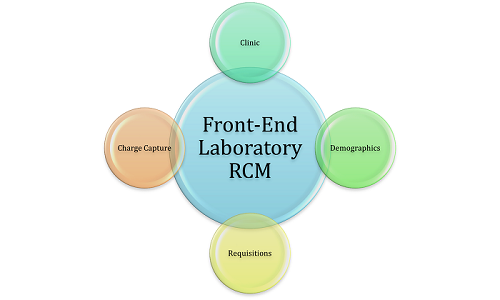By: Cassie Penn, Client Manager, Lighthouse Lab Services
Laboratories have been in a whirlwind since the COVID pandemic started in 2019. Now that we have reached the end of the pandemic and the Public Health Emergency, laboratories need to work on tightening up their revenue cycle management (RCM) processes.
The importance of the RCM front end

Front-end clinical processes are just as important as the back-end processes in the lab RCM cycle. Clinical laboratory leaders may wonder if clinical processes in the front end reflect how they collect revenue on the back end. The answer is unequivocally YES. Sloppy processes in the front end can and will impact revenue. This is typically seen in audits, pre-payment reviews, and takebacks from government and commercial insurance plans.
Self-auditing of practices to identify areas of concern is an important process of any laboratory compliance plan. The Department of Justice (DOJ) recently announced criminal charges against 18 defendants across the US for their alleged participation in various fraud schemes involving healthcare services that exploited the COVID-19 pandemic. While some of these labs were likely knowingly engaging in fraudulent practices, others may have been able to avoid these issues through diligent self-auditing and review.
What do front-end processes include?
Front-end processes include items such as:
- physician orders
- patient demographics
- charge capture within the laboratory information systems (LIS).
It is imperative for laboratories to implement education plans to help physicians understand the importance of requisition requirements, medical necessity, and patient demographics. We’re going to walk through each of these items below.
Patient demographics
If a lab does not receive clean data initially, it costs the laboratory both time and expense. Most laboratories have staff who are dedicated solely to working incorrect patient demographics. Unfortunately, staffing is always an issue, and recovering patient demographics is often one of the first things put on the back burner if the clinic does not have time to supply the correct or missing information.
This is where technology comes into play. Laboratories can implement systems that provide integration between the EMR and LIS, to ensure demographics flow from EMR to LIS. This system puts a hard stop in place and automatically pulls the demographics, so clinic staff do not have to manually enter demographics into an ordering system. These technologies do not always provide the correct data; however, laboratories can utilize programs that provide insurance eligibility and discovery tools. It is also important for laboratories to track demographic entry error rate and provide feedback to clients.
Requisition design and electronic orders
It is important for laboratories to ensure they have a valid order on hand. The order must be complete, with the provider’s signature and medical necessity documented. A signature from an ordering provider, on a requisition for labs, signifies knowledge, approval, acceptance, and obligation. A valid signature can be handwritten or electronically signed. Signatures must be legible, or able to be confirmed by comparing them to a signature log. Stamped signatures are not acceptable unless authenticated that the ability to sign is impaired by a disability.
How can laboratories best ensure the order is complete on the front end? Utilizing technology is important for reducing manual processes. For example, you can offer clients an electronic system that is authenticated and is easily identifiable as electronic instead of a typed signature. Most authenticated electronic orders will state the order is electronically signed/authorized by the ordering provider’s name and credentials.
What if we utilize paper requisitions?
Laboratories still utilizing paper requisitions can utilize specimen processors to review the requisition for mandatory items, such as ordering provider and diagnosis codes. If the requisition is inadequate, the specimen should be flagged, and staff should follow up with the provider to get the missing information. Laboratories should measure key performance indicators (KPIs) by clinic/provider so follow-up education can be provided to the ordering practice.
Why implement these processes on the front end? Having complete orders in place ensures complete orders will be sent when billing staff have a request for medical records. If an incomplete order is pulled and sent to the payor this opens the door for denials, audits, and pre-payment reviews.
Charge capture
Another crucial part of a lab’s front-end processes is how charges are captured. This is completed by ensuring the correct current procedural terminology (CPT) codes are tied to the test. Laboratories should periodically perform coding audits to ensure they are using correct CPT Codes. They’ll also want to be sure to utilize rules within their LIS that can prevent incorrect or duplicate information from crossing into the billing system. If proper rules are not set, it can cause denials or cause the laboratory to be flagged by payers for audits.
Conclusion and next steps
When these front-end processes are broken, they put unneeded stress on the back end of the revenue cycle. Staff are focused on trying to fix unnecessary issues instead of focusing on other lab RCM activities. Laboratories that use streamlined processes to prevent the breakdown of necessary information can get the claim out the door in a timely manner. Broken processes in the front end cause inefficient processes on the back end and delay claim processing. The RCM process is complicated, with many tasks and functions that must come together.
How can Lighthouse RCM Solutions help? Our team specializes in revenue cycle auditing, refining revenue cycle process, and negotiating managed care contracts. Our experts utilize a three-tiered process of assessing revenue strategy, management, and insight to help clients find weaknesses and strengthen billing processes. This includes all processes in the laboratory revenue cycle. By specializing and working exclusively with laboratories and pathologists, our team has insight into industry trends and key payer issues that are affecting laboratories today.
Contact us for a free consultation to learn more about how we can help improve your lab’s RCM.
